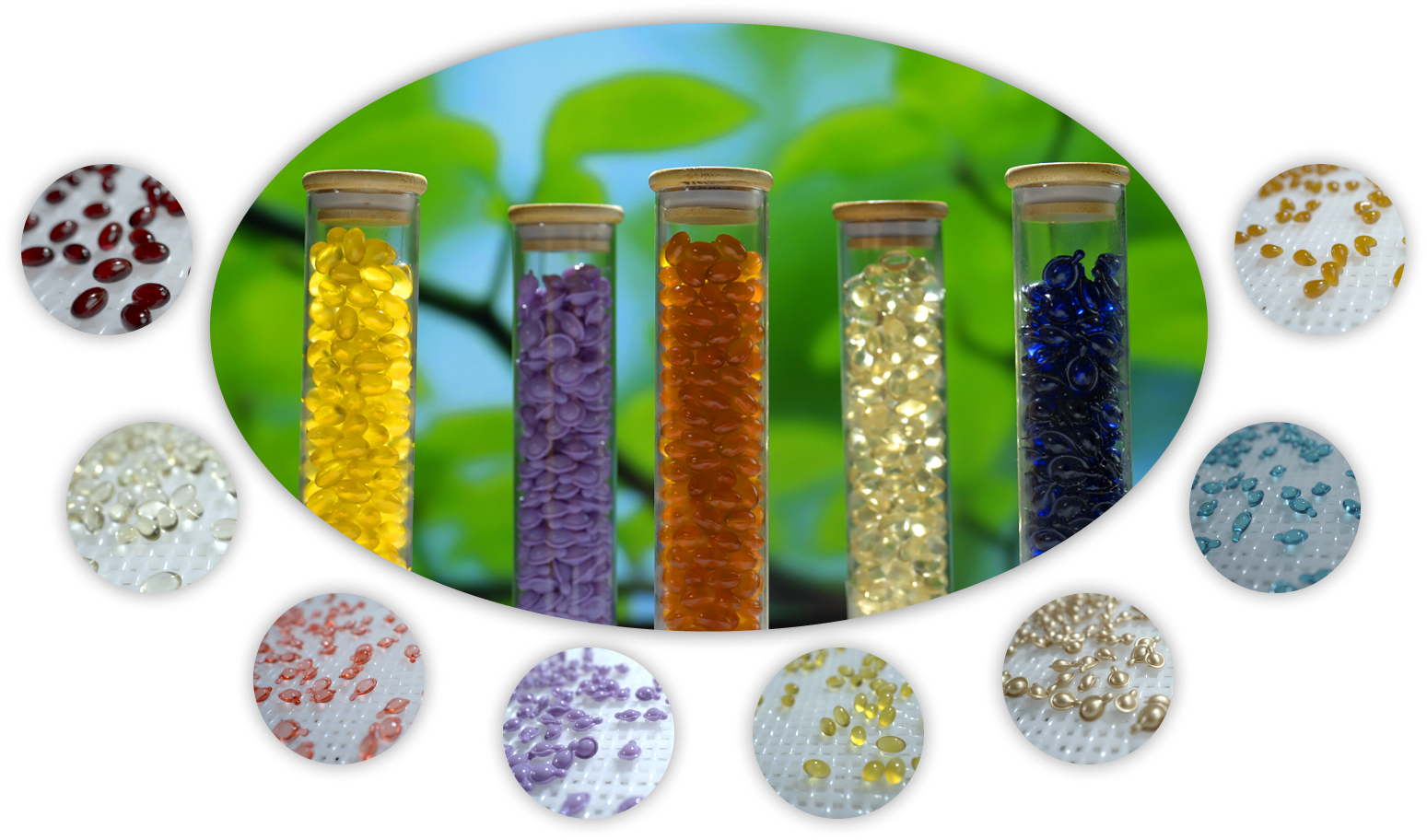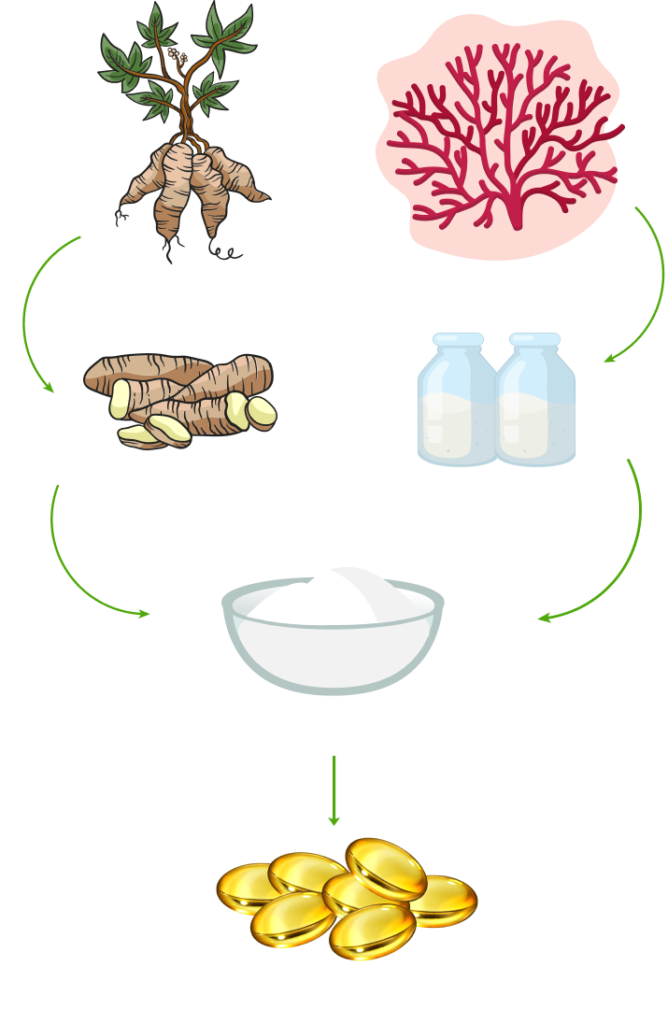Introduction to Plant-Based Softgel Encapsulation: Full Guide
Plant-based soft gel encapsulation is an innovative solution for creating vegan, cruelty-free, eco-friendly alternatives to traditional gelatin capsules. There is a growing demand for natural plant-based products in the soft gel encapsulation industry. Unlike gelatin derived from animal by-products, veggie soft gels use gelling agents such as modified starches and pectin.
Advancements in materials and manufacturing processes have made it possible to produce high-quality vegan soft gels that are just as effective as their gelatin counterparts. Vegetarian soft gel encapsulation is suitable for a wide range of applications, such as pharmaceuticals, supplements, vitamins, and beauty products.
In this guide, we explore different plant-based materials, the processes, benefits, and future trends of non-gelatin soft gel encapsulation.
Introduction to Vegan (Plant-Based) Softgel Encapsulation
Vegan soft gel encapsulation is a process that uses plant-derived materials to create a flexible, easy-to-digest capsule. It provides a plant-based alternative to traditional gelatin soft gels, and plant-based capsules are suitable for delivering active ingredients such as vitamins and minerals.
The shift towards vegan soft gel encapsulation is driven by several factors, primarily the rise in vegan and vegetarian diets. More consumers are seeking products that align with their values, like protection of animals and sustainability.
Materials Used in Vegan Softgel Production
Plant-based materials provide properties similar to gelatin, including stability, elasticity, and a smooth and easy-to-swallow nature. There are several materials that manufacturers in the gelatin free soft gel industry use.
Modified Starches
Most modified starches common in vegan soft gel production are from natural starch sources such as potatoes, tapioca, corn, and rice. These starches undergo specific modifications to enhance their functional properties. Modifications make them well-suited for creating soft, flexible, and durable capsules.
Modified starches are sourced from various plant sources and chemically or physically altered to improve their features. The most common sources of modified starches include.
Cornstarch
Manufacturers extract cornstarch from the endosperm of corn kernels. Two polysaccharides comprise the corn kernels: amylose (which contributes to gel formation) and amylopectin (which imparts elasticity and flexibility).
Corn starch undergoes various modification processes to enhance its functional properties. Modified cornstarch forms strong, stable gels, providing the necessary structure for soft gel capsules. It has excellent film-forming properties, enabling the creation of thin, flexible, and resilient capsule shells. These shells encapsulate various ingredients, including herbal extracts, oils, and vitamins.
Cornstarch is a natural plant-derived material that is non-toxic and free from allergens. Hence, cornstarch is biodegradable and safe for consumption, making it suitable for various dietary needs and vegan and vegetarian lifestyles.
Tapioca Starch
The cassava plant is the primary source of tapioca starch, which is increasingly popular for producing plant-based tapioca starch. It has excellent gelling properties, a neutral taste, and a smooth texture. The cassava roots produce tapioca starch, comprising amylopectin and amylose, two polysaccharides.
Cassava cultivation has a low environmental impact, making it an eco-friendly choice.
Tapioca starch has a high amylopectin content, contributing to its elasticity and ability to form clear, smooth gels. Its strong gelling properties are crucial for creating the structural framework of soft gel capsules. Tapioca starch forms transparent, smooth, resilient films, providing functional performance and aesthetic appeal.
Because tapioca starch has a neutral taste and odor, it makes an ideal carrier for active ingredients in soft gels. It, therefore, does not interfere with the flavor or aroma of the encapsulated substances.
Potato Starch
The primary source of potato starch is the tubers of a potato plant. Its high amylopectin content enables potato starch to form strong gels suitable for encapsulation. Potatoes are widely known for their excellent gelling capabilities and transparency.
Potato starch forms a clear, transparent gel, which is visually appealing and desirable in soft gel capsules. Its transparency is essential for softgels that need to showcase their contents, such as specialized or colored supplements.
The elasticity of potato starch ensures that the soft gel capsule can withstand mechanical stress during production, packaging, and consumption.
Rice Starch
Milled rice is the primary source of rice starch, an essential material in producing vegetable gel. Rice grains endosperm, specifically white rice, produce rice starch. Its fine texture and excellent gelling capabilities make it an ideal alternative for animal-based gelatin.
Rice starch is naturally gluten-free, making it ideal for various dietary needs. Consumers with allergies and sensitivities prefer rice starch soft gels because they are gluten-free. Rice starch has a very fine particle size, contributing to a smooth, uniform texture in the soft gel capsule.
Rice starch forms clear, translucent gels, enhancing soft gel capsules’ visual appeal. It is an ideal plant-based material for products where the appearance of the encapsulated material is essential.
Pea Starch
Yellow pea seeds are the primary sources of pea starch. They have a high amylose content, strong gelling abilities, and sustainability. Yellow peas are a type of legume with a high protein content.
Pea starch forms elastic gels that provide flexibility to the soft gel capsule, ensuring it can withstand mechanical stress during processing and consumption. The elasticity also contributes to a smooth and pleasant mouthfeel.
The visual clarity of pea starch enhances the overall aesthetic appeal of the soft gel product. It is also easily digestible and is a source of dietary fiber.
Pectin
It is a naturally occurring polysaccharide found in the cell walls of fruits, particularly in citrus fruits and apples. Pectin is primarily sourced from citrus peels and apple pomace. These fruit parts have galacturonic acids, which can form gels in the presence of sugar and acid.
The pectin structure allows it to create a firm and stable gel, essential for forming the shell of soft gel capsules. Pectin is available in two primary forms.
- High methoxyl(HM) pectin: It requires a combination of high sugar concentration and acidic conditions to form a gel. HM pectin is essential for applications where a strong, resilient gel is necessary.
- Low Methoxyl (LM) Pectin: It only forms gels in the presence of calcium ions rather than sugar and acid. LM pectin is only thus suitable for low-sugar formulations, mainly in dietary supplements and health-related products.
However, amidation is necessary to reduce the gelatin temperature and enhance gel stability; amidation is ideal for soft gel applications. You can also adjust the level of calcium sensitivity to get a gel with desired strength and elasticity.
Pectin’s ability to form gels in various conditions allows for formulation options in soft gel production. It is compatible with many active ingredients, including herbal extracts, vitamins, and minerals.
Because pectin is stable across a broad pH range, it is suitable for encapsulating acidic and alkaline ingredients. It is this stability that ensures that the soft gel capsules maintain their integrity and effectiveness throughout their shelf life.
Glycerin
Glycerin, or glycerol, is a crucial ingredient in plant-based soft gel encapsulation. It enhances soft gel capsules’ stability, texture, and shelf life. The glycerin manufacturers use in vegan soft gel capsules comes from vegetable oils such as coconut, soybean, or palm oil.
Glycerin is a non-toxic, biodegradable, and renewable resource for vegan soft gel formulations. It is a clear, viscous, and odorless liquid comprising three hydroxyl groups with hydrophilic solid (water-attracting) properties. Glycerin combines with starch-based materials, and pectin improves the final product.
Glycerin performs several critical functions in the manufacturing of plant-based soft gel capsules.
|
Function |
Description |
|
Plasticizer |
As a plasticizer, glycerin reduces the brittleness of the capsule shell and enhances its flexibility. |
|
It ensures that the vegan soft gel is less prone to cracking. |
|
|
Softening agent |
Glycerin adds softness to the capsule, making it easier for consumers to swallow. |
|
Stabilizer |
Glycerin helps to stabilize the plant-based gel by maintaining its structure and consistency under different storage conditions. |
|
It is this stability that ensures that the capsule retains shape and effectiveness over time. |
|
|
Humectant |
Glycerin helps retain moisture within the gelatin vegetarian substitute. |
|
Its ability to hold and absorb water prevents the capsules from becoming too dry or brittle, maintaining their softness. |
Glycerin-based soft gels are ideal for encapsulating a range of dietary supplements, including omega-3 oils, herbal extracts, and vitamins.
Plant-Based Oils
Plant-based oils act as the fill material for encapsulating active ingredients. The oils provide nutritional, ethical, and functional benefits, making them an essential raw material in vegan and vegetarian soft gel products.
There are several plant-based oils that manufacturers of vegan soft gels use: flaxseed, olive, coconut, hemp seed, sunflower, and safflower oils. The primary functions of plant-based oils in soft gel encapsulation include.
- Active ingredients carrier: Some active ingredients, such as fat-soluble vitamins (A, D, E, and K) and herbal extracts, require a lipid base for maximum absorption. The body better absorbs these nutrients when delivered in an oil-based medium.
- Formulation stabilizer: The oils help to stabilize the encapsulated ingredients by protecting them from oxidation and degradation. The active compounds will, therefore, be potent throughout the product’s shelf-life.
- Nutritional benefits: Plant oils are rich in essential fatty acids ( a great source of plant-based omega 3,6,9), antioxidants, and vitamins. They offer additional health benefits, becoming an excellent source of nutrition.
- Compatibility with plant-based gelling agents: Plant oils are highly compatible with gelling agents such as modified starches and pectin. Their ability to blend well with the shell material ensures that the soft gel capsule remains stable and easy to manufacture.
Manufacturing Process of Vegan Softgel Capsules
The manufacturing process of vegan soft gel capsules involves a series of specialized steps designed to ensure the quality and stability of the final product. We highlight a step-by-step procedure for manufacturing vegan soft gel capsules.
- Capsule shell formulation
Making the shell is the first step in producing vegan soft gel capsules. The primary ingredients for the shell include modified starches or pectin. You’ll also need a plasticizer such as glycerin or sorbitol to prevent the capsule from becoming brittle.
Water is also necessary to create the right consistency for the soft gel material, ensuring a smooth encapsulation process. Once you have all the ingredients, put them in the melting tank of the vegan soft gel encapsulation machine. The mixture creates a uniform gel-like substance.
- Preparing the fill material
You can then proceed with the formulation of the fill material. The fill material for vegan capsules mainly comprises plant-based oils, active ingredients, and other liquid substances. Prepare the fill material in a sterile environment to ensure product safety.
- The encapsulation process
At this stage, the soft gel capsules vegan and filling occurs. You’ll need specialized equipment, such as the plant-based soft gel die roller. The machine consists of two rotating die rolls that shape the soft gel capsule shell from the plant-based gel mixture.
As the die rolls rotate, injecting the fill material into the capsule commences. Applying heat and pressure completely seals the soft gel capsule. The rotary die machine ensures precise weight control of the capsule shell and the fill material, ensuring uniformity in size and dosage across all capsules.
- Soft gel capsules drying
After sealing, the vegan soft gel capsules dry to remove excess moisture from the shell. Drying is essential to maintain the capsules’ shape and quality during storage.
Immediately after encapsulation, you will transfer the soft gels to a tumble dryer. The tumbler removes the surface moisture in this phase, ensuring an even drying process. The next step is to place the soft gels on drying trays in a controlled environment.
The circulating air removes any remaining moisture from the shell. The drying process can last several hours to a few days, depending on the formulation and size of the vegan soft gel capsules.
- Quality control and inspection stage
Your quality control team performs rigorous inspection and quality control checks to ensure your products meet industry standards and specifications. The quality control officers visually examine the capsules for defects such as cracks, deformations, or leaks.
The team takes a sample of the capsules to ensure that the weight of the capsule and the fill material fall within specified tolerances. Stability testing is also essential to ensure that the vegan soft gel capsules can withstand various environmental conditions, such as temperature and humidity.
- Polishing and finishing
After passing the quality control test, polishing the vegan soft gels to give them a smooth, glossy appearance is the next step. Polishing improves the product’s visual appeal and makes the capsules easier to swallow.
You can place the soft gel capsules in a polishing machine, which uses gentle mechanical action to remove any surface imperfections and give the capsules a smooth finish.
- Packaging
It is the last stage in the manufacturing process of the plant-based capsules. Packaging happens in blister packs or bottles, depending on the product and customer preferences. Blister packaging provides individual protection for each capsule, while bottles are convenient for bulk storage.
Sealing the packaging is essential to ensure product freshness and safety. The last step is to label the packaging, providing enough information about the product, including the ingredients, dosage, and expiration date.
Why Choose Plant-Based Ingredients for Softgels?
There are various benefits to choosing plant-based ingredients for soft gel capsules. We highlight why gelatin vegetarian substitutes are becoming increasingly popular in producing soft gels.
- Vegan and vegetable-friendly: Plant-based soft gel capsules are ideal for vegans and vegetarians who avoid animal-derived products. Traditional soft gel capsules comprise a gelatin shell from animal collagen, primarily from cows or pigs. However, manufacturers offer plant-based options such as modified starch and pectin that align with the dietary preferences of a growing number of consumers. Vegetarian soft capsules also cater to religious dietary restrictions such as Halal or Kosher since they do not contain animal-derived ingredients.
- Enhanced nutrient absorption and easier digestion: Plant-based materials are often easier to digest than animal-based gelatin. Ingredients such as pectin derived from fruits are gentle on the stomach. The oils and plant-based carriers in vegan soft gels can enhance the absorption of fat-soluble vitamins and other nutrients, ensuring consumers receive the full benefits of their supplements.
-
- Allergens-free: Veggie soft gels lack common allergens such as soy, gluten, and dairy, making them a safer option for people with allergies or sensitivities. Animal-derived gelatin can occasionally cause allergic reactions.
- Ethical and cruelty-free production: Vegetable gels do not involve the exploitation or harm of animals, which appeals to those who prioritize animal welfare. Manufacturers opting for plant-based ingredients show commitment to ethical sourcing, sustainable production, and transparency.
- No risk of animal-related contaminants: Animal-derived gelatin carries potential contamination risks from animal-borne diseases such as mad cow disease. However, plant-based ingredients eliminate this risk, offering a safer and more reliable option. Vegan soft gel capsules do not contain antibiotics, hormones, or other chemicals often associated with livestock production.
- Sustainability and environmental impact: Plant-based ingredients such as modified starches and pectin are derived from renewable resources that are less taxing on the environment. On the other hand, gelatin production requires intensive livestock farming, which contributes to greenhouse gas emissions, deforestation, and water usage. Consumers are becoming more conscious of their environmental impact and seeking sustainable, eco-friendly products.
- Ingredient transparency and clean label: Most plant-based capsules appeal to consumers seeking clean-label products. They are made from recognizable, natural ingredients primarily sourced from plants. Consumers appreciate the transparency and simplicity of plant-based formulations without artificial additives and chemicals.
Key Differences Between Gelatin and Plant-Based Softgels
Gelatin and vegetarian soft gels differ significantly in ingredients, consumer appeal, and production methods. In the table below, we highlight the key differences between the two types of soft gel.
|
Gelatin-Based Soft Gels |
Plant-Based Soft Gels |
|
The source is animal by-products such as collagen from the skin, bones, and connective tissues from fish, pigs, and cows. Gelatin serves as the gelling agent that forms the capsule shell. |
Modified starches (tapioca, pea, rice) and pectin are the main sources of plant-based capsule shells. |
|
They are unsuitable for vegans, vegetables, or those adhering to Koshel or Halal dietary laws. |
Because they are free from animal-derived by-products, vegetarian soft capsules are ideal for vegans and vegetarians. They are also suitable for consumers with dietary preferences or restrictions and are often certified as Halal or Kosher. |
|
Some people might experience digestive issues related to animal proteins or gelatin allergies. |
Plant-based ingredients are gentler on the digestive system, making them ideal for individuals with food allergies and sensitive stomachs. |
|
The manufacturing process relies on heating and dissolving the gelatin in water, followed by rotary die equipment encapsulation. |
While the encapsulation equipment might be similar, the gelling agents and drying requirements differ. Some plant-based capsules require longer drying times or specific environmental control. |
|
Gelatin capsules can be sensitive to temperature and humidity changes, leading to stickiness, brittleness, or hardening over time. They require careful packaging and storage to maintain stability. |
Plant-based capsules are generally more resistant to temperature fluctuations and do not degrade as quickly in high humidity. They have a longer shelf-life and remain stable in various environmental conditions. |
|
There is a potential for allergic reactions in individuals sensitive to animal proteins. |
They are typically free from common allergens and animal-borne contaminants. |
|
Gelatin soft gels are smooth and glossy and are often preferred for easy swallowing. The strength and flexibility of gelatin result in clear, consistent, or slightly tinted capsules. |
The plant-based soft gels also have a smooth and finished finish but are slightly firmer and clearer. Due to non-gelatin ingredients, their texture might differ slightly, though still easily swallowable. |
|
They are more cost-effective due to the long-established production methods and availability of animal products. |
They are slightly more expensive due to the need for specialized equipment and formulations. However, the cost gradually decreases as the demand increases and production techniques improve. |
Challenges in Plant-Based Softgel Manufacturing
While plant-based soft gel capsules offer numerous benefits, they also present unique challenges. Highlighted below are some of the key obstacles that manufacturers face.
Formulation complexities: Plant-based gelling agents such as modified starch and pectin can behave differently than gelatin. Achieving the right texture, flexibility, and integrity of the capsule shells can be challenging as the plant-based ingredients might have different viscosity. Not all active ingredients or encapsulated materials are compatible with veggie soft capsule materials. Managing the moisture levels of vegan soft gels is more challenging.
Equipment challenges: Traditional soft gel production equipment is designed for gelatin-based capsules. The different properties of plant-based materials may often necessitate adjustments. However, at Jangli Equipment, we offer vegan soft gel encapsulation equipment.
- Production challenges: Veggie soft gels often require more drying than gelatin capsules. The slower water evaporation process can increase production time and cost, which is a challenge for manufacturers. Achieving consistent capsule quality can be more challenging with plant-based materials.
-
- Shelf life and stability: Vegetarian soft capsules, especially those made with modified starches, can become brittle over time, especially in low-humidity environments. It requires special packaging or additives to maintain the soft gel’s shelf life. Because vegan soft gels are more susceptible to temperature and humidity, ensuring stability over time can be challenging. High heat or humidity exposure can lead to capsule deformation, stickiness, or degradation of the encapsulated product.
- Oxidation: Veg soft gels often encapsulate oils that are prone to oxidation. Ensuring the protection of these oils from oxidative damage requires nitrogen flushing or antioxidant additives, which can be expensive.
- Costly: Plant-based gelling agents are often more expensive than animal-based gelatin. Sourcing high-quality raw materials at scale presents financial challenges for manufacturers. Due to the need for specialized agricultural products, the supply chain for plant-based ingredients can be more complex. Ensuring a consistent supply of high-quality ingredients for large-scale producers can be more challenging than sourcing gelatin.
- Regulatory and certificate requirements: Ensuring that every ingredient used in gelatin free soft gels meets vegan certification standards can be complex as it requires careful verification of suppliers and manufacturing processes. You’ll also need third-party certifications, such as the Vegan Society, Kosher, Halal, or Certified plant-based, adding to production costs.
- Consumer expectations: Consumer acceptance of veggie soft gels can be influenced by differences in taste and texture. Some plant-based materials may impart a slight taste and odor to the capsules, deterring consumers. Gelatin soft gels are known for their smooth, transparent appearance, which consumers often prefer. Vegetarian soft gels, however, may appear more opaque or have a different texture, potentially affecting their aesthetic appeal.
Applications of Vegan Softgel Capsules
Vegan soft gel capsules have become increasingly popular in various industries due to their versatility, compatibility with different dietary preferences, and eco-friendly nature. Below are some of the key applications of vegan soft gel capsules.
|
Industry |
Specifications |
|
Pharmaceuticals |
Vegan soft gel capsules are becoming popular for over-the-counter(OTC) drugs such as pain relievers and cough suppressants. They offer a more consumer-friendly dosage form that is easy to swallow and fast-acting due to the liquid and semi-liquid content. |
|
Some pharmaceutical companies are exploring plant-based soft gels for prescription drugs for patients with dietary restrictions and allergies. |
|
|
Soft gels containing natural oils and active pharmaceutical ingredients (APIs) are standard in topical gel formulations, delivering medications easily absorbable through the consumers’ skin. |
|
|
Cosmeceuticals |
Veg soft gels are becoming popular as beauty supplements promoting skin, hair, and nail health. Vitamin E and biotin collagen-boosting nutrients are often encapsulated in plant-based capsules for easy consumption. |
|
Vegan soft gels can also deliver powerful anti-aging nutrients, helping to support skin hydration and elasticity. |
|
|
Veggie soft gels are ideal for encapsulating CBD and Hemp oil products, which are popular in the wellness industry for pain management, stress relief, and relaxation. |
|
|
Nutritional supplements |
Vegan soft gels often encapsulate essential vitamins and minerals such as vitamins B12, and D, multi-vitamin complexes, and omega-3 fatty acids. |
|
Gelatin-free capsules are also ideal for encapsulating herbal supplements such as turmeric and other botanical extracts. |
|
|
They offer an excellent probiotic solution, helping protect the sensitive probiotics from environmental factors. |
|
|
Sports and performance supplements |
Vegan soft gels deliver pre-workout ingredients, providing fast absorption and enhancing athletic performance and endurance. |
|
They can also deliver recovery supplements containing amino acids to help athletes recover more effectively after intense physical activity. |
|
|
Veg soft gel capsules also encapsulate protein supplements and fat burners, allowing fitness enthusiasts to meet their nutritional needs conveniently. |
Quality Control and Testing in Plant-Based Softgel Production
During every vegan soft gel manufacturing stage, you must lay down stringent quality control (QC) and testing protocols. QC for vegan soft gels differs from gelatins due to the unique properties of plant-based ingredients. We highlight the key quality control measures and testing procedures that you can use to guarantee the integrity, safety, and effectiveness of veggie soft gels.
Raw Material Quality Assurance
You must ensure that all raw materials, including plant-based gelling agents, meet the required specifications. Verify the source of non-gelatin ingredients to ensure they are free from contaminants, pesticides, and animal-derived substances.
As a manufacturer, it is essential to conduct audits of suppliers to verify that they adhere to Hala, Kosher, and vegan standards. You might have to check if the supplier has certifications from the Vegan Society and Non-GMO project.
Ensure raw materials are tested before production to assess moisture content, viscosity, and purity. The raw materials must meet specific criteria for the success of the vegan soft gel production process.
In-Process Quality Control
QC teams should monitor the consistency of the capsule shell and fill material during the manufacturing process to ensure uniformity. Color, thickness, or viscosity variations could lead to defective soft gels.
Ensuring the correct fill volume and capsule weight is vital for delivering the proper dosage of active ingredients. Use precision equipment to measure and control the volume of the encapsulated liquid, preventing issues such as under or over-filling.
Unfortunately, gelatin-free capsule shells are more prone to defects like brittleness, splitting, or stickiness. QC teams perform real-time checks on the integrity of the soft gel shell to ensure proper encapsulation and sealing, reducing the risk of leaks or spoilage.
You can integrate automated testing equipment into the production line to detect defects such as air bubbles, improperly sealed soft gels and deformed capsules. The machines will immediately remove defective products, minimizing waste and maintaining product quality.
Post Production Testing
After producing the vegan soft gels, they undergo visual and physical inspections for uniformity in size, color, shape, and appearance. One of the tests (dissolution) ensures that the plant-based capsules dissolve within the required time frame upon consumption. Dissolution testing further assesses how quickly and efficiently the active ingredients are released from the capsule into the body.
Another essential test is to check the moisture content. Maintaining the correct moisture content is critical for the stability and flexibility of plant-based soft gels. Hence, QC teams perform mixture content tests to ensure that the capsules are neither too dry nor too moist.
Performing tests such as vacuum and pressure ensures that the vegan soft gels are adequately sealed and leak-free. The tests check for any weaknesses in the capsule shell, ensuring the fill material is protected.
Microbial and chemical testing
Like all ingestible products, it is essential to test gelatin-free capsules for microbial contaminants such as mold, yeast, and bacteria. Plant-based ingredients can sometimes have a higher microbial load than animal-derived gelatin. Conduct stringent hygiene protocols to minimize contamination risks.
You should also conduct stability tests to determine the shelf life of non-gelatin soft gels. These tests measure the stability of the soft gel shell and the encapsulated material under various conditions, such as light exposure, humidity, and temperature. The goal is to ensure the soft gels maintain their integrity and effectiveness over time without degrading or losing potency.
QC teams conduct oxidation tests to ensure encapsulated oils remain stable and do not turn rancid during storage. You will need antioxidants or special packaging to protect the oils from oxidative damage.
It is also essential to test the chemical composition of the organic soft gel shell and active ingredients to ensure no harmful substances are present. Consumers of “ clean label” or “ natural ” products expect transparency regarding the products’ ingredients.
Consumer acceptability testing
Sensory testing is essential to assess the taste and smell of the vegan soft gels. While non-gelatin soft gels are designed to mask the taste of encapsulated ingredients, it’s necessary to ensure that no odors or off-flavors are present.
Visual appeal is also important. While plant-based soft gels might differ in appearance from gelatin capsules, the QC team checks on color consistency and clarity to ensure the soft gels are aesthetically pleasing.
Packaging and storage testing
Proper packaging plays a crucial role in maintaining the quality of organic soft gels as it protects them from light, moisture, and oxygen. Hence, the QC team must test the integrity of the packaging materials to ensure they provide an adequate barrier to environmental factors.
You should also focus on packaging security by incorporating tamper-proof seals, safety labels, and child-resistant closures. Because the industry is shifting toward sustainability, you should use eco-friendly and biodegradable packaging solutions.
Regulatory Compliance and Documentation
You should conduct regular audits to ensure the vegan soft gels meet regulatory standards and guidelines. The QC team must ensure that the soft gels meet the certification standards for Halal, non-GMO, Kosher, and organic.
It is essential to conduct regular audits, inspections, and compliance checks to ensure that products meet the safety and quality requirements. Accurate labeling is also vital to avoid misleading consumers, and the QC team tests the products to ensure compliance with labeling claims.
Future Trends in Plant-Based Softgel Technology
As consumers’ demand for plant-based, eco-friendly, and cruelty-free products grows, the plant-based soft gel industry is evolving rapidly. New technological advancements, materials, and production processes drive the next generation of vegan soft gels. Below are some key future trends shaping the non-gelatin soft gel industry.
|
Trend |
Description |
|
Gelling agents and materials |
Researchers are looking for innovative raw materials that have improved functionality over traditional gelling agents, such as modified starch. |
|
Future innovations include durable, more flexible, and versatile plant-based materials that perform similarly or better than gelatin. |
|
|
Eco-friendly solutions |
Manufacturers focus on sourcing their raw materials from farmers who use ethical and sustainable sources. |
|
Some companies are also experimenting with edible gelatin-free soft gel packaging, eliminating the need for external packaging. It is one way of reducing plastic waste. |
|
|
Targeted delivery systems |
The future of organic soft gels includes designing capsules that can release their contents in specific areas of the body. Pharmaceuticals and nutriceutical companies will find this useful, as it will reduce side effects by delivering the ingredients to where they are needed. |
|
Advanced plant-based capsules may offer sustained or controlled release mechanisms, ensuring a steady release of active ingredients over time. Targeted delivery systems are especially beneficial for supplements that require long-term absorption, such as omega-3 fatty acids. |
|
|
Personalized Nutrition |
It will be possible to customize plant-based soft gel capsules for individual consumers based on their unique nutritional needs due to advances in digital health. |
|
On-demand manufacturing systems could allow your consumers to order customized vegan soft gels with specific ingredients or dosages. |
|
|
Advanced Softgel Manufacturing Technologies |
The future of non-gelatin soft gels may include more automated processes driven by artificial intelligence (AI) and machine learning. Such advanced technologies could enhance production efficiency and reduce defects. |
|
Rather than batch production, future manufacturing soft gel facilities could adopt continuous production systems, leading to less downtime and reduced operational costs. |
|
|
Hybrid soft gel capsules |
Future veggie soft gels may incorporate multi-layer designs, allowing the encapsulation of multiple ingredients in separate layers. Hybrid soft gels will make it possible to deliver incompatible ingredients within a single soft gel. |
|
It will also be possible to combine solid and liquid ingredients in a single vegetarian soft gel, providing more flexibility in formulations. |
Conclusion
Plant-based soft gels offer a sustainable and ethical alternative to traditional gelatin capsules. Advancements in plant-based materials like modified starches and pectin have made it possible to produce high-quality, vegan-friendly soft gels. Investing in reliable, cutting-edge equipment is essential to stay in this expanding market.
Jangli Equipment provides state-of-the-art vegan soft gel encapsulation equipment. Whether you’re entering the plant-based market or looking to upgrade your production capabilities, we ensure the highest standards of quality and performance.
Ready to optimize your veggie soft gel production? Contact Jangli Equipment today to learn more about our customizable solutions and take your manufacturing to the next level.









